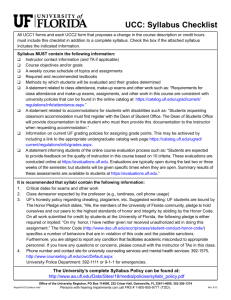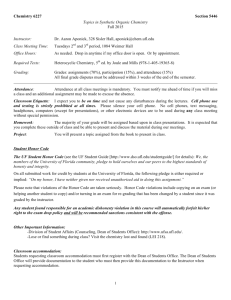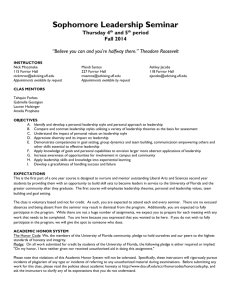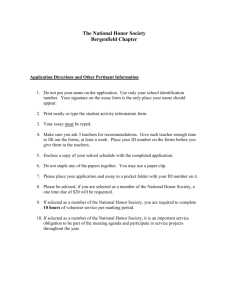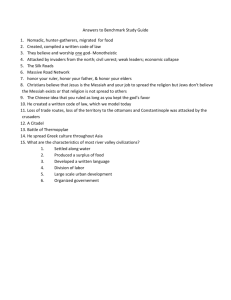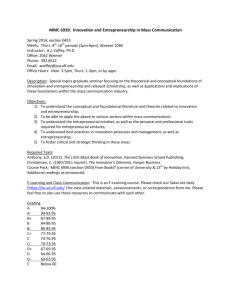Fall 2011 Syllabus
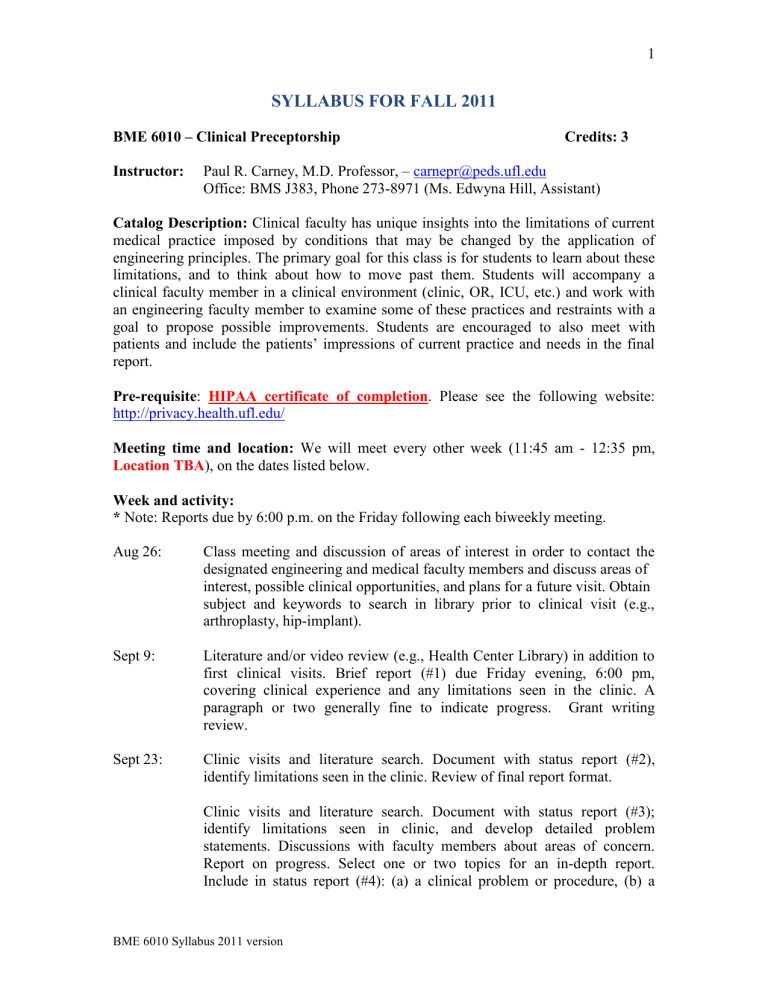
1
SYLLABUS FOR FALL 2011
BME 6010 – Clinical Preceptorship Credits: 3
Instructor: Paul R. Carney, M.D. Professor, – carnepr@peds.ufl.edu
Office: BMS J383, Phone 273-8971 (Ms. Edwyna Hill, Assistant)
Catalog Description: Clinical faculty has unique insights into the limitations of current medical practice imposed by conditions that may be changed by the application of engineering principles. The primary goal for this class is for students to learn about these limitations, and to think about how to move past them. Students will accompany a clinical faculty member in a clinical environment (clinic, OR, ICU, etc.) and work with an engineering faculty member to examine some of these practices and restraints with a goal to propose possible improvements. Students are encouraged to also meet with patients and include the patients’ impressions of current practice and needs in the final report.
Pre-requisite : HIPAA certificate of completion . Please see the following website: http://privacy.health.ufl.edu/
Meeting time and location: We will meet every other week (11:45 am - 12:35 pm,
Location TBA ), on the dates listed below.
Week and activity:
* Note: Reports due by 6:00 p.m. on the Friday following each biweekly meeting.
Aug 26: Class meeting and discussion of areas of interest in order to contact the designated engineering and medical faculty members and discuss areas of interest, possible clinical opportunities, and plans for a future visit. Obtain
Sept 9: subject and keywords to search in library prior to clinical visit (e.g., arthroplasty, hip-implant).
Literature and/or video review (e.g., Health Center Library) in addition to first clinical visits. Brief report (#1) due Friday evening, 6:00 pm, covering clinical experience and any limitations seen in the clinic. A paragraph or two generally fine to indicate progress. Grant writing review.
Sept 23: Clinic visits and literature search. Document with status report (#2), identify limitations seen in the clinic. Review of final report format.
Clinic visits and literature search. Document with status report (#3); identify limitations seen in clinic, and develop detailed problem statements. Discussions with faculty members about areas of concern.
Report on progress. Select one or two topics for an in-depth report.
Include in status report (#4): (a) a clinical problem or procedure, (b) a
BME 6010 Syllabus 2011 version
2 possible improvement needed, and, (c) companies involved in providing technology being used (e.g., Medical Device Registry in library). Focus on writing in-depth report, include progress in status report (#5).
Oct 7:
Dec 2:
Student oral presentations #1
Oct 21: Student oral presentations #2
Student oral presentations #3 Nov 18:
Dec 2: Student oral presentations #4
Final reports deadline
Attendance is expected at each meeting. Please discuss absences with the TA and/or professor prior to (when possible) or immediately after for unexpected absences. Reports are assigned as discussed below. There will be a presentation at the end of the semester about the progress made during the semester.
For the Clinical Preceptorship Reports: These are due biweekly on Friday evenings by
6:00 p.m. They should be brief, not more than 1-2 pages. Tell us what you have done the last two weeks and what your thoughts are. Feel free to include questions or uncertainties.
Final in depth report : (total 8-10 pages, double spaced and numbered).
1. Cover sheet: name, date, title, engineering faculty preceptor, medical faculty
preceptor.
2. Abstract.
3. Summary of clinical exposure/ experience (1 page). Remember to note patient comments if available.
4. Medical/Engineering background of problem indicating an unmet need (1-3 pages).
5. Proposed improvement or study to ‘narrow the question’.
6. Indication of planned steps to be taken in item 5.
7. References. (Include titles and all authors, and try to use mostly peer-reviewed journals. If web sites are used, include the date accessed since sites change.)
Remember – this is mainly a proposal of how to address a need which you have heard about or witnessed at the Medical Center during this preceptorship experience. You may choose to propose a new device, a new procedure or simply a new study, which could be done to better define critical issues which need better analysis so that an engineering approach to problem solving can be implemented later (perhaps by someone else).
Take the ‘broad view’. For instance, the pacemaker was originally a large external, bedside machine, which had stability problems. When asked to help to stabilize it, an engineer suggested: “with transistors, we can make it very small. Why not try implanting it?”
BME 6010 Syllabus 2011 version
3
This is an “active observational” course and it is not a substitute for research, not a diary
(although that is part of this), nor simply a review of the state of the art. The brief (one page) biweekly reports are required to be turned in by 6:00 p.m. Friday on week 2, 4, etc. to the faculty listed below. Email is fine. The final in-depth report is also due by 6:00 p.m. on Wednesday of the last week of classes.
Please make a mailing list for this class and send your reports, by e-mail, to:
1. Dr. Paul R. Carney, Professor ( carnepr@peds.ufl.edu
)
3. Teaching Assistant: TBA
4. The physician who will act as a preceptor (when assigned)
Grading is by the COE faculty coordinators after discussion with the HSC faculty. It is approximately based 50% on the short reports and 50% on the final report. Students are responsible for turning in their reports on time.
In order to graduate, graduate students must have an overall GPA and an upper-division
GPA of 3.0 or better (B or better). Note: a B- average is equivalent to a GPA of 2.67, and therefore, it does not satisfy this graduation requirement. For more information on grades and grading policies, please visit: http://www.registrar.ufl.edu/catalog/policies/regulationgrades.html
It is possible that some patentable technology may result from this collaboration, and information on how UF manages this for students and faculty is at the OTL web site
( http://rgp.ufl.edu/otl/ ). Remember that a person who clearly indicates a problem to someone who helps come up with a new way of solving it is generally considered a coinventor. Hence, physicians and engineers are frequently both listed as inventors on patents.
------------------------------------------------------------------------------------------------------------
Most important:
When a patient is present, students should observe only and not ask questions or make comments. Remember or write down such comments or questions for a later, more appropriate time.
Also, there is a dress code for professionals in the Health Center who interact with patients. When you visit, please dress appropriately (no shorts, sandals, etc.). Wear dress shirts (men).
Make sure that you read something about the specialization area, which you are going to observe before meeting with a physician. Good introductory books are available in the
Health Center library.
There are new requirements for confidentiality of patients (the Health Insurance
Portability and Accountability Act: HIPAA). Please visit the following web sites and
BME 6010 Syllabus 2011 version
4 complete the required questionnaires prior to your first meeting with your preceptors. This is mandatory per university regulations. Please fill out the confidentiality statement at: http://privacy.health.ufl.edu/policies/ and take the general awareness training (an online module) at: http://privacy.health.ufl.edu/training/genawareness/online.asp
Academic Honesty:
In adopting this Honor Code, the students of the University of Florida recognize that academic honesty and integrity are fundamental values of the University community.
Students who enroll at the University commit to holding themselves and their peers to the high standard of honor required by the Honor Code. Any individual who becomes aware of a violation of the Honor Code is bound by honor to take corrective action. A studentrun Honor Court and faculty support are crucial to the success of the Honor Code. The quality of a University of Florida education is dependent upon the community acceptance and enforcement of the Honor Code. We, the members of the University of Florida community, pledge to hold ourselves and our peers to the highest standards of honesty and integrity. On all work submitted for credit by students at the University of Florida, the following pledge is either required or implied: "On my honor, I have neither given nor received unauthorized aid in doing this assignment."
Students with Disabilities:
Students requesting classroom accommodation must first register with the Dean of
Students Office. The Dean of Students Office will provide documentation to the student who must then provide this documentation to the Instructor when requesting accommodation.
___________________________
BME 6010 Syllabus 2011 version
